

What Everyone Who Uses The Internet Needs To Know About CISPA. By Annie-Rose Strasser.

Insanity: CISPA Just Got Way Worse, And Then Passed On Rushed Vote. We Don't Need SOPA Because DMCA Is Already Broken Enough. Freakonomics: Piracy Costs the Economy $200 B. a Year? ‘These Figures Were Made Up Out of Thin Air’ Attempts to quantify the cost of IP piracy have failed, say Kal Raustiala and Chris Sprigman.
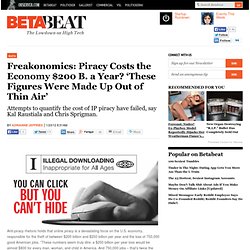
By Adrianne Jeffries 1/23/12 8:31am Share this: Anti-piracy rhetoric holds that online piracy is a devastating force on the U.S. economy, responsible for the theft of between $200 billion and $250 billion per year and the loss of 750,000 good American jobs. “These numbers seem truly dire: a $250 billion per year loss would be almost $800 for every man, woman, and child in America. How the Internet blackout affected congressional support for PIPA/SOPA.
Meet ACTA; It’s SOPA and PIPA on steroids, the Global Edition. SOPA and PIPA have been shelved, however, the government’s plan to censor the public is an ongoing threat.
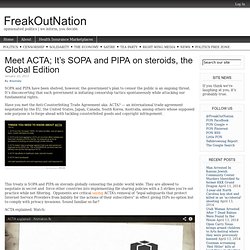
It’s disconcerting that each government is initiating censorship tactics spontaneously while attacking our fundamental rights. Have you met the Anti-Counterfeiting Trade Agreement aka: ACTA? — an international trade agreement negotiated by the EU, the United States, Japan, Canada, South Korea, Australia, among others whose supposed sole purpose is to forge ahead with tackling counterfeited goods and copyright infringement.
The Sopa blackout protest makes history. Wednesday 18 January marked the largest online protest in the history of the internet.
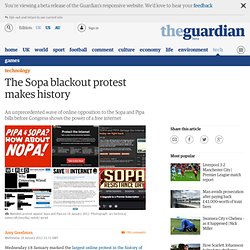
Websites from large to small "went dark" in protest of proposed legislation before the US House and Senate that could profoundly change the internet. The two bills, Sopa in the House and Pipa in the Senate, ostensibly aim to stop the piracy of copyrighted material over the internet on websites based outside the US. Critics – among them, the founders of Google, Wikipedia, the Internet Archive, Tumblr and Twitter – counter that the laws will stifle innovation and investment, hallmarks of the free, open internet.
The Obama administration has offered muted criticism of the legislation, but, as many of his supporters have painfully learned, what President Barack Obama questions one day, he signs into law the next. First, the basics. Sopa could, then, shut down a community-based site like YouTube if just one of its millions of users was accused of violating one US copyright. : Information Clearing House.
The Definitive Post On Why SOPA And Protect IP Are Bad, Bad Ideas. There's been plenty of talk (and a ton of posts here on Techdirt) discussing both SOPA (originally E-PARASITE) and PROTECT IP (aka PIPA), but it seemed like it would be useful to create a single, "definitive" post to highlight why both of these bills are extremely problematic and won't do much (if anything) to deal with the issues they're supposed to deal with, but will have massive unintended consequences.
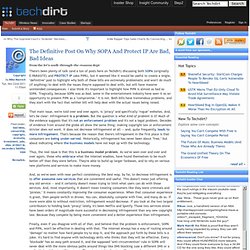
I also think it's important to highlight how PIPA is almost as bad as SOPA. Tragically, because SOPA was so bad, some in the entertainment industry have seen it as an opportunity to present PIPA as a "compromise. " It is not. Controversial Copyright Bills Would Violate First Amendment–Letters to Congress by Laurence Tribe and Me « Marvin Ammori. Who in Congress Supports SOPA and PIPA/PROTECT-IP? Informed Comment: Thoughts on the Middle East, History and Religion.
How PIPA and SOPA Violate White House Principles Supporting Free Speech and Innovation. Wikipedia to shut for 24 hours to stop anti-piracy act. White House Airs Objections to SOPA, PIPA Anti-Piracy Bills. Score one for Google.
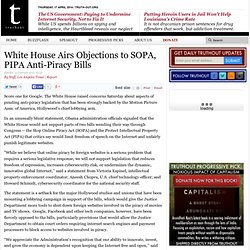
The White House raised concerns Saturday about aspects of pending anti-piracy legislation that has been strongly backed by the Motion Picture Assn. of America, Hollywood's chief lobbying arm. DNS provision pulled from SOPA, victory for opponents. In a move the technology sector will surely see as a victory, a controversial antipiracy bill being debated in Congress will no longer include a provision that would require Internet service providers to block access to overseas Web sites accused of piracy.

Rep. Chairman Lamar Smith (R-Texas), one of the biggest backers of the Stop Online Piracy Act, today said he plans to remove the Domain Name System requirements from the Stop Online Piracy Act . "After consultation with industry groups across the country," Smith said in a statement released by his office, "I feel we should remove DNS-blocking from the Stop Online Piracy Act so that the [U.S. House Judiciary] Committee can further examine the issues surrounding this provision.
"We will continue to look for ways," Smith continued, "to ensure that foreign Web sites cannot sell and distribute illegal content to U.S. consumers. " Smith's decision comes a day after Sen. Rupert Murdoch squares off with Obama over online piracy legislation. Hollywood or Silicon Valley? — Obama faces a difficult choice on SOPA. A controversial online piracy bill could force President Obama to choose between two of his most important allies: Hollywood and Silicon Valley.
Obama hasn’t taken a position yet on the Stop Online Piracy Act (SOPA) that has divided senior lawmakers in both parties, but that will have to change if it clears Congress. If Obama signs the bill, he will dash the hopes of Silicon Valley executives who donated heavily to his 2008 campaign and are vehemently opposed to the anti-piracy measure. But the entertainment industry would see a veto as a betrayal by the administration on its most significant priority. Media reform through education, organizing and advocacy. Stop Online Piracy Act. Proponents of the legislation said it would protect the intellectual-property market and corresponding industry, jobs and revenue, and was necessary to bolster enforcement of copyright laws, especially against foreign-owned and operated websites.
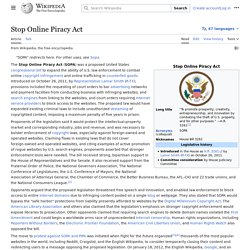
Claiming flaws in present laws that do not cover foreign-owned and operated websites, and citing examples of active promotion of rogue websites by U.S. search engines, proponents asserted that stronger enforcement tools were needed. Opponents claimed that the proposed legislation threatened free speech and innovation, and enabled law enforcement to block access to entire internet domains due to infringing content posted on a single blog or webpage.
They expressed concerns that SOPA would bypass the "safe harbor" protections from liability presently afforded to websites by the Digital Millennium Copyright Act. Overview[edit] Stay On Top of the Fight Against SOPA/PIPA with These Tools.